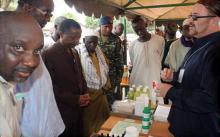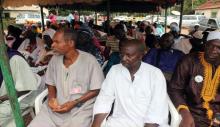Gambia observes African Traditional Medicines Day (TRM) 2012
Banjul, 06 September 2012 -- The tenth edition of the African Traditional Medicines Day was planned, coordinated and commemorated by the Ministry of Health and Social Welfare in collaboration with the WHO Country Office and the national Traditional Healers Association of The Gambia (TRAHASS). It was launched at the Kanifing Municipal Council’s Grounds on Friday 31st August 2012.
Deputizing for the Honorable Minister of Health and Social Welfare, Fatim Badjie, the Permanent Secretary, Dr. Makie Taal reiterated his ministry’s, and indeed the Gambia Government’s commitment to promoting traditional medicines in the country. Dr Taal said the significance of TRM Day is to promote traditional medicine in the African Region by increasing public awareness on their uses and importance in complementing conventional medicines.
Dilating on this year’s theme – “The decade of African Traditional Medicine Day: what impact”, - Dr. Taal highlighted that the theme engenders the urge for reflection and evaluation of developments in traditional medicine in WHO African member states for the last ten years.
Being the oldest source of health care in most countries including the Gambia, he said that over 30% of modern medicines are derived directly or indirectly from medicinal plants, some of which include antimalarials such as quinine and artemisinin and analgesics such as aspirin.
Because of the importance attached to traditional medicine, PS Taal noted that the Ministry of Health and Social Welfare has established a functional traditional medicines unit, developed a traditional medicines policy and most importantly Code of ethics for the practice has also been formulated. He also cited the huge number of traditional healers registered in the country as being exceptional and thanked the Gambian leader, His Excellency, Sheikh Professor Alhaji Dr. Yahya A.J.J Jammeh, who himself is a renowned traditional healer, for supporting TRM in the Gambia..
PS Taal also thanked the WHO and the West Africa Health Organization for their support in promoting traditional medicines in the country.
For his part, the WHO Representative, Dr Thomas Sukwa, gave highlights of some of the achievements gained as WHO in supporting countries to strengthen their traditional health systems for malaria prevention and control over the past decade, with financial support from the Canadian International Development Agency (CIDA).
This, he went on, has resulted in increased traditional medicines policies within countries from 8 in 2000 to 39 in 2010; those with national medicine strategic plans and code of ethics for traditional health practitioners increased from zero to 18 over the same period; countries with TRM regulatory frameworks increased from 1 in 2000 to 28 in 2010; while those with national traditional medicine programmes increased from 10 in 2000 to 24 in 2010.
Coming closer home to The Gambia, Dr. Sukwa said WHO was able to support and provide guidance to the national traditional medicines programme at the Ministry of Health and Social Welfare and that has resulted in the following:-
- A National Traditional Medicine Policy was developed in 2005;
- A National Strategic Plan was also elaborated in order to guide the implementation of the national policy;
- A Code of Ethics for Traditional Healers was finalized aimed at regulating the practice of traditional healing practices;
- Registration of Traditional Healers was conducted throughout the country, leading to the formation of TRAHASS;
- Logistical support was provided to strengthen the Traditional Medicine Unit at the Ministry of Health and Social Welfare.
In conclusion, Dr Sukwa assured the health authorities of WHO’s continued support through the Ministry of Health and Social Welfare and in particular the national Traditional Medicine programme based on Government of the Gambia priorities and urged them to reflect on their individual and collective actions in the past decade and measure what impact it has on the promotion, provision and regulation of Traditional Medicine practice in the Smiling Coast of Africa.
Other speakers included the Vice President of TRAHASS and the Deputy Mayor of Kanifing Municipal Council, all adding their weight to promoting traditional medicine in the Gambia.







